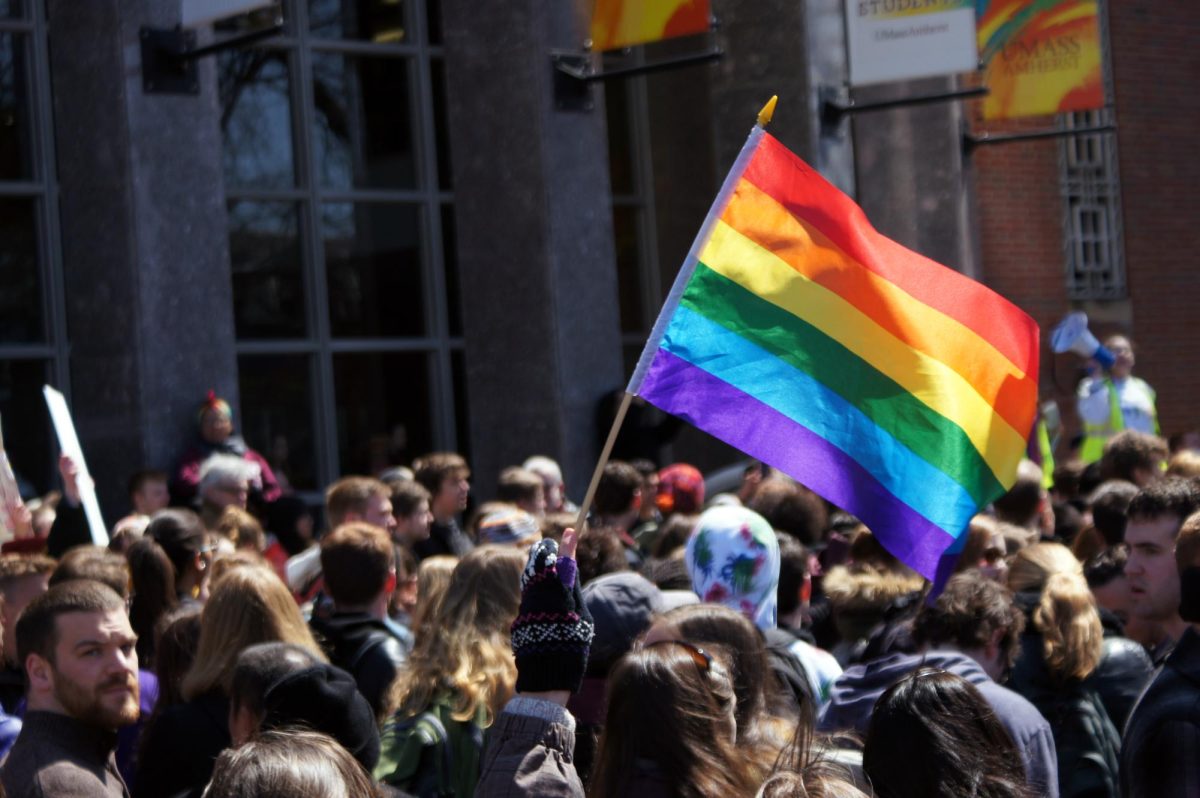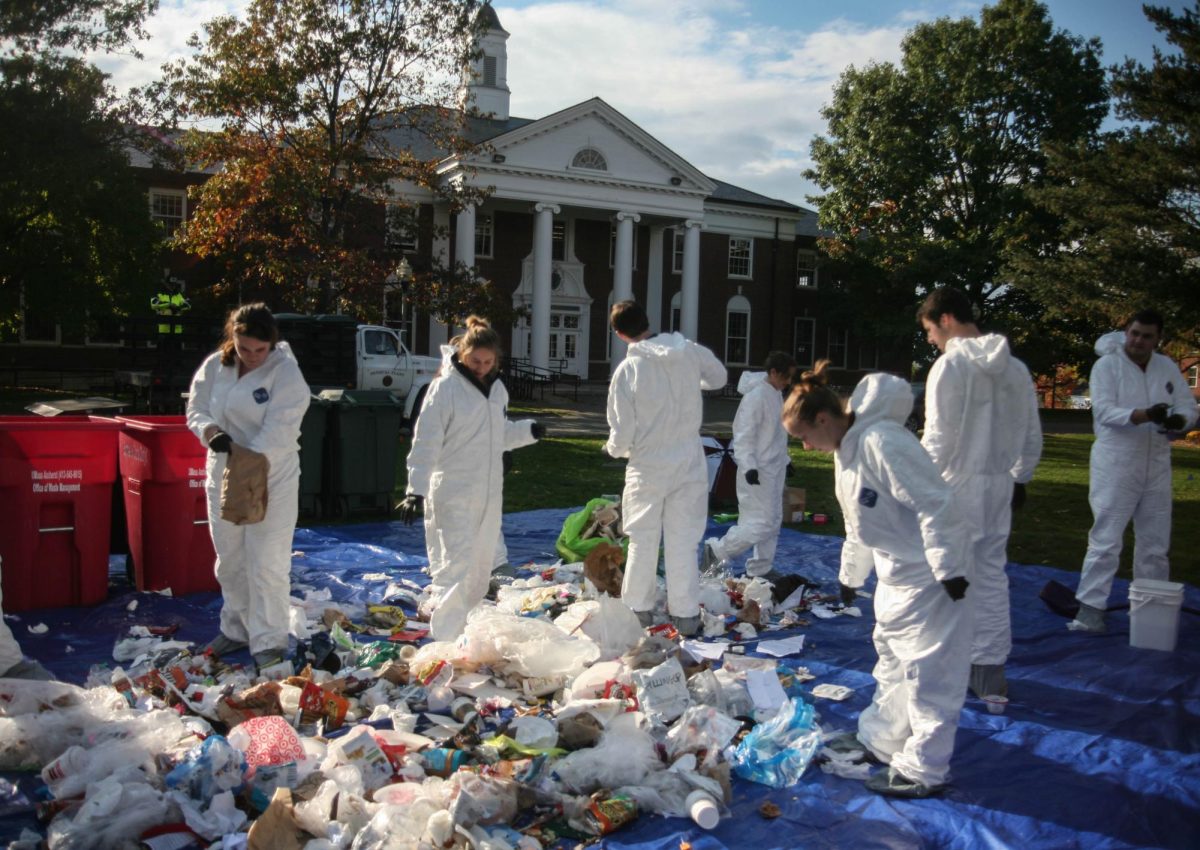
You can find the full version, “Empty Seats and the Paradox of Accessibility” from which this column was excerpted and edited on the author’s WordPress blog.
There is an abysmal level of transparency between the Student Government Association and the University of Massachusetts student body. That problem became a critical point of concern in this year’s presidential and vice presidential elections.
Voting took place through the Campus Pulse website from March 10 to 12. After several hours of vote counting, the Elections Commission released its elections report through the SGA’s Facebook page. The report revealed Sïonan Barrett and Chantal Lima Barbosa as the unofficial victors by a margin of four votes.
Something is amiss. The runner-up Kelly/Gay ticket received 1,369 votes. The Barrett/Barbosa ticket received 1,370 votes with three additional “votes with write-ins.” I find this bizarre. None of the other tickets – with the exception of the Van Leuvan Smith/Coakley ticket, which was a write-in ticket – received any of these extra “written-in” votes.
Why would the Barrett/Barbosa ticket be allowed write-in votes if it was already on the ballot? Perhaps this is just another part of the eccentric modus operandi for SGA elections. Regardless, my greater concern is how Barrett and Lima Barbosa achieved their statistically microscopic victory over Charlotte Kelly and Sammi Gay. Their campaign’s Facebook page sheds light on the matter.
On March 11 – the second day of voting – Barrett/Barbosa announced that they were opting out of that evening’s debate in favor of “knocking on doors and engaging with students and sharing their platform face to face.” Excuse my rather literal interpretation, but that reads as, “Knocking on doors and soliciting votes.” Now, I was unable to attend the debate because I was studying for an exam, but I would have attended as a constituent of the student body that these potential leaders must protect. Their decision to skip the debate in favor of canvassing is profoundly arrogant.
Conor Snell, web managing editor for DailyCollegian.com, confirmed to me that the site garners an “average daily unique visitor count” which is “about equal to the total amount of students that voted in this SGA election,” which is, according to the elections report, 3,423 students. Even if Barrett and Lima Barbosa were able to reach hundreds of students in 90 minutes (the approximate runtime of the debate they skipped), their reach still pales in comparison to the traffic that the paper’s report undoubtedly gained the next morning.
The Collegian is, as noted on its online and printed masthead, “a free and independent press.” The outreach it lends is unsolicited and accessible to all students with Internet access, which the University provides for all on-campus residents.
Barrett and Lima Barbosa threw away their chance to reach thousands of students through the Collegian’s coverage. And they seem to have unknowingly indicted themselves. The ticket posted pictures of what amounts to evidence of vote solicitation. One such picture featured one of the candidates standing with a student on his phone in Berkshire Dining Commons and was tagged, “How’s this for accessibility?”
But that’s not making your platform accessible – that’s shoving your platform in the face of whatever student you convince to listen to you.
And what student wouldn’t vote for a charismatic candidate who presents an in-the-moment reasonable platform? Saying “yes” would diffuse that moment less awkwardly than refusing would. Judging by the outcome of the election, the approach worked. I just don’t understand how it was allowed.
Wind the clocks back a year. The winning Devenney/Miske/Cook ticket of the 2014 SGA spring elections, when student trustee and president/vice president candidates could campaign together, was invalidated. Why? The Elections Commission reasoned the candidates’ use of a 10 percent off coupon from Campus Design and Copy allowed them to print an extra quantity of campaign fliers that exactly matched the number of votes by which they won the election.
In a hearing with the SGA Judiciary, the Commission used these egregiously speculative mathematics in its argument and the invalidation was allowed to stand. I sat in on that hearing and the absurdity of its result so infuriated me that I wrote my first op-ed for the Collegian.
The DMC invalidation debacle creates a striking irony with the Barrett/Barbosa victory. Last year, the victorious ticket and the voices of every student who voted for it were all invalidated because the Commission convinced the Judiciary that some extra fliers around campus possessed the extrasensory powers necessary to make a barely correlated number of students vote for Ellie Miske, Gabrielle Cook and Emily Devenney.
This year, Barrett and Lima Barbosa scoffed at the opportunity to discuss their ideas with the other candidates in a well-reported forum and instead stormed the dorms and dining commons necessary to reach a crowd that they could persuade to vote. While Kelly and Gay were vocalizing their ideas for improving UMass from within the SGA, Barrett and Lima Barbosa were cheerleading for voters.
Let’s compare the social media campaigns of the winning ticket and runner-up. At the time of this writing, Kelly Gay for SGA had 651 likes on Facebook; Barrett and Barbosa for SGA had 391. Kelly Gay for SGA’s Twitter account sent 169 tweets, followed 915 users and gained 110 followers; Barrett/Barbosa for SGA’s has sent 47 tweets, followed 170 users and has 30 followers.
This data suggests that Kelly and Gay ran a more involved and more consistent social media campaign than Barrett and Lima Barbosa did. It also calls back to the larger problem with which I introduced this column: transparency between the SGA and students.
Kelly and Gay transparently communicated a nuanced platform. Throughout their campaign, they posted key points to convey a clear sense of what they would do if elected. If you want more details on how they seek to enact these changes, you can visit their campaign’s Weebly site, which describes the entire platform on a scrolling page that took me roughly 20 minutes to read.
Barrett and Lima Barbosa include their platform on the About section of their campaign’s Facebook page, which will take you at most two minutes to read. If you want specificity on par with the Kelly/Gay platform, you won’t find it. You will, however, discover Barrett/Barbosa’s hopes to create a “Central UMass Amherst App,” which looks like it would combine various preexisting apps and online services and attribute all credit to the president/vice president’s benevolent leadership.
The problem here is not concision. There isn’t an unnecessary word in Kelly and Gay’s platform – it’s just that there are more than cursory details. Compare the two tickets side by side and you’ll see the Kelly/Gay platform comes with a more nuanced version of almost everything Barrett/Barbosa has to offer, plus a lot more for no extra charge.
Kelly and Gay have a comprehensive plan “to make sure that UMass Amherst is the most accessible place for all students, regardless of age, race, gender, ability, sexual orientation, etc.,” according to Kelly. It’s unfortunate they weren’t planning on developing an unnecessary app, but I can let that slide.
I look at the elections report and worry because I simply don’t know what the barely victorious Barrett and Lima Barbosa are going to do if these results get ratified. I do not know if they will fight to protect the University’s lifeblood – its students – in the way that I know that Kelly and Gay will.
I would ask president-elect Barrett what she’s going to do when she takes office but after the election results came out, she unfriended me on Facebook and made her Twitter account private. I guess not voting for her means that I deserve to be silenced and out of the loop. Or maybe that’s just how elected representatives are supposed to treat their constituents. Perhaps I’m behind the times.
At least I might see her “on TV one day delivering your daily dose of news.” A student government presidency ought to add some nice padding to a resume.
Now how’s that for accessibility?
Nathan Frontiero is a Collegian columnist and can be reached at [email protected].



















Has been • Mar 28, 2015 at 3:56 pm
Megan, stay graduated
Zac Bears • Mar 28, 2015 at 5:51 pm
“Has been,” you scared or something?
Megan K • Mar 26, 2015 at 9:28 pm
As someone that has been a pseudo- member of both SGA and CEPA, and someone that has the respect for both organizations and believes that the school benefits best when SGA and CEPA are tactically working together and communicating; I just want to say that this article and the elections is not a CEPA versus SGA issue and having a username be “Defund CEPA” is an unwarranted bullying tactic. I fear that the elections, which used to be heated yet overall civil, have become an “us versus them” mentality that is detrimental to progress within the University. I know it is naïve to say “Can’t we all just be friends? “ However, it is not an outrageous ask for two groups of incredibly passionate students to work simultaneously on common goals. Let’s not make every issue a CEPA versus SGA showcase of who has more power or who is right. This article, written by an individual who is not speaking for, nor is even a member of CEPA should not spark anyone to insinuate defunding CEPA. Furthermore, conflating personal friendships with membership (e.g. Nate being friends with members of CEPA does not mean he IS CEPA nor does it mean all of his thoughts/words/ideas are CEPA sponsored and approved) is a dangerous assumption to make with unforeseeable, negative impacts. Looking from the outside in, it seems as though anyone with a dissenting opinion to the SGA gets thrown into the *~troublemaking~* CEPA group to bring down both individual radical students and the Center for Education Policy & Advocacy. While Nate may be friends with members of CEPA, he does not represent the group and should not be seen as such. Moreover, publically critiquing the SGA and/or it’s members should not be met with threats of defunding. To take my own advice, I will not treat this “Defund CEPA” user as a sentiment coming from the whole of SGA. But I do hope that the money SGA allocates to agencies, RSOs, and the like does not become a tool of power and manipulation as it was used by this user.
Kara • Mar 26, 2015 at 5:00 pm
Aside from how passive-aggressive these comments are, hooooooold up cause Gone Girl is a great movie.
Nathan Frontiero • Mar 26, 2015 at 4:33 pm
Thanks for reading, guys!
Kris • Mar 26, 2015 at 10:45 am
Did you write this big long piece because someone unfriended you? Sounds like you are sad 🙁
C • Mar 25, 2015 at 11:28 am
You must be confused about what exactly “accessibility” is. Both campaigns were extremely accessible, especially through social-media. Furthermore, SGA holds regular open meetings and its members are very accessible to meet privately (most of the time, you just need to walk in the door). Poor voter turnout and general lack of knowledge of SGA doings isn’t because the SGA operates in some smoke-filled, closed-door room. Its indicative of a broader, more nuanced issues around campus apathy and perhaps lack of SGA legitimacy.
Now, as to the results of the election. Yes, the elections commission has been under scrutiny, but they also make sure to do their job well. Last year DMC, unfortunately, admitted to the Commission that they had broken rules and the Commission had to find them accountable. Yes, the rules are archaic, but they Commission holds all groups to them. I am curious to see the other write-in votes, and how exactly the ones for Barret-Barbosa were counted. Though, even if we disqualified the concept of write-ins for candidates already on the ballot, Barret-Barbosa would still win; even if it was JUST 1 vote.
Kelly-Gay ran a great campaign, but you can’t simply say that they deserve to win because you personally liked the quality of their campaign more than Barret-Barbosa. On top of that, BB skipping out on the debate isn’t a lack of transparency, it was a strategic move–and frankly, one I’m surprised others didn’t think of taking. The debate happened after elections began–completely useless! A large number of people would have voted by that time, why waste time on a debate that annually has a poor showing? For the Collegian press, perhaps? Hardly worth it. The Collegian rarely reports groundbreaking SGA news that affects or changes campus-culture towards our student government; this election season was no different.
Now, this article could have made excellent points about the need for more student participation in elections, or clearer rules and regulations regarding elections. But frankly, you make it sound as if you’re just upset that Ms. Barrett unfriended you on facebook. Yes, she’s now less accessible to you, but that’s only through her PERSONAL accounts. Grow up, request a meeting during her office hours, and write something that doesn’t make you (and the Collegian) sound bitter about the elections.
Defund CEPA • Mar 24, 2015 at 11:17 am
youre a biased writer with an ego problem and a gone girl type crush on Charlotte Kelly
Anonymous • Mar 24, 2015 at 7:34 am
So campaigning in person is somehow “profoundly arrogant” and an “indictment” of their campaign? Just so you know, that’s not against the rules, nor should it be. Personal conversation is not coercion, and there had already been several Collegian articles on the campaign, so it’s inaccurate to say they chose to forgo representation in the Collegian entirely.
They were “allowed” write-in votes because people wrote them in for whatever reason. It makes no difference if a vote is a write-in or not, a vote is a vote and every vote counts.
As you’re so knowledgeable of the DMC invalidation, it’s disappointing you’re leaving so much basic information out.
-The 10% off coupon they used not only allowed them far more fliers, but also was unavailable for anyone else to use.
-DMC was caught campaigning in dorms without an escort. They literally knocked on the door of two elections commissioners.
-DMC used their own personal printer to produce even more extra fliers, giving them even more extra resources, despite that being specifically against the rules.
-For a bonus point, at the hearing about the above they tried to get someone to lie about bullet #2 and say she escorted them, even though neither witness saw her there and she’d already admitted she hadn’t escorted them in a message to the elections commission.
This I got straight from the report and the hearing. I read it also noted they signed a document acknowledging their awareness of the rules prior to campaigning. I don’t know much more about it, but if you’re going to protest that invalidation do so accurately.